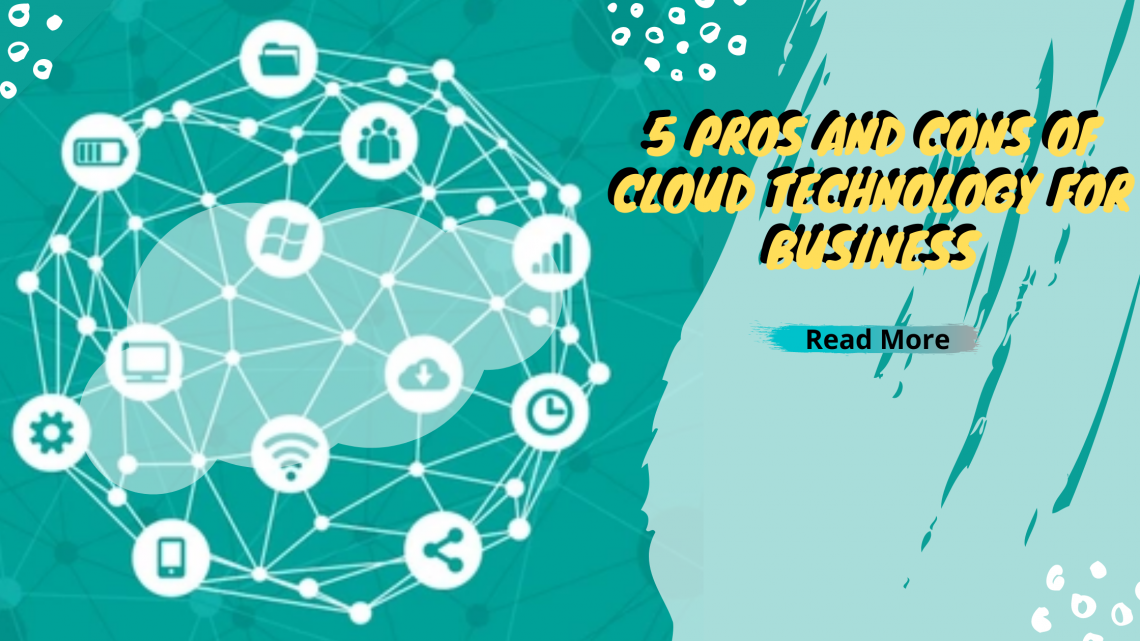
5 Pros and Cons of Cloud technology for Business
Cloud computing has become prominent across businesses worldwide. Organizations whether small, medium, or large, all are shifting their IT infrastructure to the cloud. For IT and small business cloud has developed as a turning point.
This technology is admired by industry experts and anticipate this trend would only expand and evolve in the coming years. It is undoubtedly of great benefit to businesses, but it is important to understand its pros and cons.
In this article, let us understand the different advantages and drawbacks of Cloud Computing hosted by business. There are a lot of businesses that are generally uncertain about whether or not they should opt for cloud computing.
What is Cloud Computing?
Cloud computing generally relates to providing computing resources over the cloud such as infrastructure, storage, networking, database, analytics, and applications. Here cloud refers to the internet. The organizations that offer these services are known as Cloud providers.
Cloud computing has three categories which are Software-as-a-Service (SaaS), Platform-as-a-Service (PaaS), and Infrastructure-as-a-Service (Iaas).
Cloud Computing Pros
1. Affordable
Cloud computing is one of the most affordable technology to use, manage, and update. For the businesses, an older desktop version of the program was more expensive. Businesses need to pay the licensing fee which is very costly for the businesses to go longer if you want multiple user services.
Cloud has drastically changed the whole scenario as it arrives at very reasonable prices and can eliminate some of the company’s important expenditures. Infrastructure and premises are not needed. The administration as well as the operating costs are also eliminated.
2. Reliable
Cloud computing offers your organization reliability. This is much better than in-house IT infrastructure due to its self-managed service. They provide you with Service Level Agreement with Cloud that presents you with 24×7 connectivity. It helps you to perfectly handle everything with its vast pool of IT resources and a speedy recovery mechanism.
This means if a server fails due to whatever causes, all the applications and services hosted could conveniently be relocated to any resources available.
3. Managing expertise
This is just another Cloud Computing factor. Cloud computing can enhance and strengthen IT management skills because of its central resource administration, SLA agreements, and infrastructure for managing vendors. No need to upgrade and maintain IT infrastructure as all these services are provided by the service provider.
ou are provided with a web-based user interface without any kind of installation you can access software, services, and applications.
4. Unlimited storage & backup
With Cloud, you’ll find it much easier and convenient to place your data in the cloud, and comparison to any other physical hard drives or tablets you can get back up anytime. Usually, cloud service providers manage all of the recovery issues.
Thus, backup and recovery function in much smoother and easier ways than any other traditional system. Cloud offers you unlimited storage capacity in comparison to other platforms. So you don’t need to concern about storage and the availability of space.
5. Automatic Integration of Applications
Cloud computing made the integration of the applications much simpler. It takes place automatically, and you don’t have to make any extra attempt to integrate applications. You only have to select the program fit the best for your company according to your needs, the rest will be handled by the Cloud.
Cloud Computing Cons
1. Security Concern
Cloud computing’s leading concern is security. Before opting for this revolutionary technology, you should acknowledge that all of your details are yielded with the cloud service provider the minute you get into this.
That indicates there is a huge security concern and therefore you must pick your service provider appropriately.
Choose your service provider that you are sure can keep your information absolutely secure.
2. Technological Glitches
You are likely to be a target sometimes of the technological glitches with the Cloud. Furthermore, you must know that there are always some outages that come with every technology. The normal issue you encounter will be network & connectivity related. To stay connected with the sever 24×7 you require great internet connectivity.
3. External Threats
It’s obvious that you may encounter external threats and hack attacks when you place your information in the cloud. You know this fact, too, that nothing is completely secure with the internet.
4. Inadequate Management
Since the service provider owns and controls all of the cloud resources, customers have limited control over it. They’re mainly able to handle and track files, services, and apps. The service provider manages all of the back end operations. Customers are unable to navigate certain main tasks such as upgrading, configuration management, and access to server shells.
5. Internet Connection
All your enterprise applications will run amazingly till you can sustain reliable connectivity to the Internet. But if your service providers drop connection at any moment, then all your tasks will be shut down and you will be out of access. Even in downtime, even a few most dependable servers won’t work. It is critical that you have a proper backup.
Conclusion:
Every single thing has both pros and cons. Nothing is flawless so is cloud computing. It is proven technology is the company’s greatest asset and can turn your faith, but on the other hand, it can build significant obstacles if not properly used and treated. For Tally on cloud hosting service visit Tally-on-cloud.com.
Read other related blogs:


